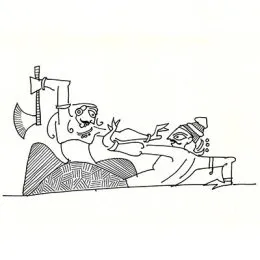The inherent violence of business

Some of the most powerful entrepreneurs and heads of industry in India believe in non-violence, which is translated as eating vegetarian food and imposing these practices on their employees, and not supporting industries involved in the production and distribution and sale of non-vegetarian food. This simplistic, convenient, even romantic view of the doctrine of ahimsa overlooks the reality of violence inherent in business.
A more realistic view was explored in the Vedas but was often overlooked by later scholars, many of whom were hermits, uninterested in the worldly path of business. A romantic view of ahimsa prevails even today amongst many entrepreneurs and activists and policy makers often to the detriment of development, and good governance.
The Vedas recognize that food forms the cornerstone of life. In a world of inanimate objects, there is no hunger and so no need for food. The presence of life means the quest for food. It is the quest for food that makes plants grow and animals run. Hunger (bubhuksha) stems from fear of death (bhaya) and is satisfied by food (bhog). To get food, plants devour elements like water, earth, wind and sunlight. Animals devour plants and animals. Thus in order to stay alive, something is being destroyed and killed, be it elements, plants or animals. This is himsa (violence) that we call sacrifice (bali) to generate bhog to satisfy bubuksha to take away the bhaya of death.
Where there is fear of death, there is himsa. He who does not fear death, does not seek food, hence does not have to kill. This is the path of the monk. But the householder is concerned with the hunger of those around him. He has to be violent in order to feed those who cannot feed themselves. Hence the concept of pancha-yagna, or the five-fold feeding: of the gods (devas), to the self (atma), to the family (putra), to the ancestors (pitra) and to the other beings that constitute nature (bhutas). As long as violence is there to satisfy authentic hunger, or need, it is dharma. As soon as violence is indulged to satisfy imagined hunger fuelled by insecurity, or greed, it is adharma. How many businessmen and shareholders can say they indulge in satisfying need only?
Modern markets are based on greed. We want consumers to consume more and more goods and services. We want them to stay hungry and paranoid. In fact, some management gurus consider this a virtue. More and more is the mantra. And so violence is perpetrated directly, indirectly, physically and psychologically, against nature and culture.
Direct violence can be seen in the act of destroying nature to build farms and human settlements and mines and dams and factories. Activists and gurus oppose this as this is tangible violence evident to all. Indirect violence is seen in the practice of banking, investment and trading that ensures there is constant supply and demand for products produced by violence. Physical violence like slavery and bonded labor and child labor continues in many forms across the industries, often outsourced to faraway countries by companies that claim to be ethical in their balance sheets, until the law catches up with them. Then there is psychological violence perpetrated by draconian rules, and work life imbalance and foul language used to stress people into letting themselves be exploited. So while we speak of 8-hour working days, companies use the mobile phone and connectivity to get people to work 24×7, thus perpetrating brutal mental violence, that is not constituted as violence, as there is no blood to be seen anywhere. But who are we fooling.
Most significantly, increasingly industries are gearing themselves to destroy culture. We want everyone to be a consumer and so we want to destroy contentment. We want tribal people to give up claims to their forests, go to school so that that they can be employees in our offices, our mines and our fields and our stores, abandoning all traditional means of livelihood, and be consumers in our markets, for our way of life is better than their way of life. We want everyone to be restless and aspirational, always hungry for more goods, more products and more ideas. We want to create consumer-junkies. For only then the market will grow and there will be prosperity all around. More bhog, demands more bali: tangible violence, intangible violence, direct violence, indirect violence, physical violence, psychological violence, consumption of non-vegetarian food notwithstanding.
Where there is violence (himsa), there is action (karma), and where there is karma there is no freedom (moksha), for we have to face the consequences of our actions, no matter how justified they may be by economists and politicians, or even religious leaders and spiritual gurus. If not by us, then by our children, or our children’s children. There is no such thing as a free bhog.
For more such stories visit: Devdutt.com
(Disclaimer: The views and opinions expressed in this article are those of the author and do not necessarily reflect the views of YourStory.)







